| Srl | Item |
| 1 |
ID:
172089
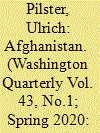

|
|
|
| 2 |
ID:
170498
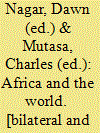

|
|
|
|
|
| Publication |
Switzerland, Palgrave Macmillan, 2018.
|
| Description |
xxxiv, 520p.: figures, tableshbk
|
| Standard Number |
9783319625898
|
|
|
|
|
|
|
|
|
|
|
|
Copies: C:1/I:0,R:0,Q:0
Circulation
| Accession# | Call# | Current Location | Status | Policy | Location |
| 059817 | 327.6/NAG 059817 | Main | On Shelf | General | |
|
|
|
|
| 3 |
ID:
171095


|
|
|
|
|
| Summary/Abstract |
[T]he historical record remains bitterly contested in the former Yugoslav lands, and none of the tribunal's findings has promoted reconciliation.
|
|
|
|
|
|
|
|
|
|
|
|
|
|
|
|
| 4 |
ID:
030555
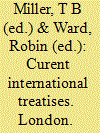

|
|
|
|
|
| Publication |
London, Croom Helm, 1984.
|
| Description |
558p.
|
| Standard Number |
0709917589
|
|
|
|
|
|
|
|
|
|
|
|
Copies: C:1/I:0,R:0,Q:0
Circulation
| Accession# | Call# | Current Location | Status | Policy | Location |
| 025941 | 341.0265/MIL 025941 | Main | On Shelf | General | |
|
|
|
|
| 5 |
ID:
028113
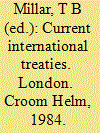

|
|
|
|
|
| Publication |
London, Croom Helm, 1984.
|
| Description |
558p.
|
| Standard Number |
0709917589
|
|
|
|
|
|
|
|
|
|
|
|
Copies: C:1/I:0,R:0,Q:0
Circulation
| Accession# | Call# | Current Location | Status | Policy | Location |
| 024764 | 341.0265/MIL 024764 | Main | On Shelf | General | |
|
|
|
|
| 6 |
ID:
131777
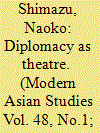

|
|
|
|
|
| Publication |
2014.
|
| Summary/Abstract |
As a significant 'moment' in twentieth-century international diplomacy, the rise of post-colonial Afro-Asia at the Bandung Conference of 1955 is replete with symbolic meanings. This paper proposes a conceptual approach to understanding the symbolic dimension of international diplomacy, and does so by ruminating on the newly unearthed Indonesian material on the Bandung Conference. To this end, 'diplomacy as theatre' is introduced as an interpretive framework to re-cast the conference as a theatrical performance, in which actors performed on the stage to audiences. Focusing on the city of Bandung, this paper reconstructs some examples of the 'performative' dimensions of international diplomacy, and elaborates on the notion of 'staging' the city and the role played by the people of Bandung, including the significance of conference venues, as well as the impromptu creation of a ritual citation that contributed to an iconic 'performative act' during the conference. Sukarno, Nehru, Zhou Enlai and Nasser all understood the importance as performers in their role as new international statesmen, representing the esprit de corps of the newly emergent post-colonial world. In deconstructing the symbolic, it will become evident that the role played by Indonesia significantly influenced the underlying script of the diplomatic theatre which unfolded at Bandung.
|
|
|
|
|
|
|
|
|
|
|
|
|
|
|
|
| 7 |
ID:
079830
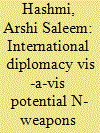

|
|
|
| 8 |
ID:
138317
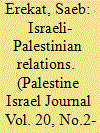

|
|
|
| 9 |
ID:
108092
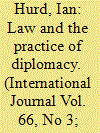

|
|
|
| 10 |
ID:
137593
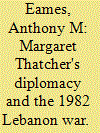

|
|
|
|
|
| Summary/Abstract |
The year 1982 emerged as pivotal in the Atlantic Alliance and the relationship between President Ronald Reagan and Prime Minister Margaret Thatcher. On 6 June 1982, Israeli Defense Forces breached the Lebanese border in a maneuvre to eradicate the Palestinian Liberation Organization. The campaign opened a violent episode in the decades-old Arab-Israeli conflict. Almost immediately the British Foreign and Commonwealth Office recognized the challenge to the international community. The crisis in the Middle East occurred during a period of substantial turnover in the foreign policy communities of both London and Washington. Subsequent improved bilateral relations between the United States and the United Kingdom paved the way for greater cooperation in international diplomacy between respective national executives.
|
|
|
|
|
|
|
|
|
|
|
|
|
|
|
|
| 11 |
ID:
158519
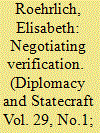

|
|
|
|
|
| Summary/Abstract |
Nuclear safeguards have been an essential part of the global order since the beginnings of the nuclear age. The International Atomic Energy Agency [IAEA], an international bureaucracy that is supposed to be a non-political, technical institution administers this global nuclear safeguards regime. Even though safeguards have always been controversial, they have turned out to be the most enduring item in the international community’s toolbox to prevent or slow down the spread of nuclear weapons to non-nuclear states. This analysis shows that nuclear safeguards, whilst they survived the fall of the Iron Curtain, were a genuine invention of the Cold War. At the beginning of the nuclear age, there was an overall understanding that safeguards were not strong enough to prevent the global spread of nuclear weapons. It was only over the course of the late 1950s and 1960s that safeguards moved from the margins to the centre of diplomatic negotiations about global nuclear order. Newly declassified records from the IAEA Archives in Vienna offer insights into the evolution of early nuclear safeguards and suggest that negotiation patterns, proceedings, and settings affected the outcome of this nuclear diplomacy.
|
|
|
|
|
|
|
|
|
|
|
|
|
|
|
|
| 12 |
ID:
130715
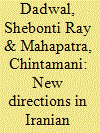

|
|
|
|
|
| Publication |
2014.
|
| Summary/Abstract |
After the June 2013 election when Hassan Rouhani became president of Iran, Iranian foreign policy changed course. The fundamental transformation is the result of his decision to open up a fresh dialogue with the United States and other Great Powers to resolve the nuclear stand-off that would end the country's isolation, lift the biting US-led sanctions and allow Iran to open a new chapter in its economic policy and international diplomacy.
|
|
|
|
|
|
|
|
|
|
|
|
|
|
|
|
| 13 |
ID:
108521
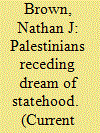

|
|
|
| 14 |
ID:
137574
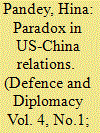

|
|
|
| 15 |
ID:
163715
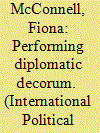

|
|
|
|
|
| Summary/Abstract |
This paper interrogates the notion of diplomatic decorum in order to shine new light on the power relations that underpin performance, rhetoric, and emotional labor in international politics. In framing decorum in terms of Aristotelian rhetoric and dramaturgical principles, the paper focuses on representatives of minority communities, indigenous peoples, and stateless nations for whom adopting social behavior appropriate for the spaces of international diplomacy takes on a heightened importance. Drawing on postcolonial critiques of diplomacy, attention turns to two distinct political repertoires and configurations of style and subject that these liminal geopolitical actors engage with. First the paper examines the extent to which “unofficial” diplomats perform behavior fitting to a particular diplomatic space and how they seek to enact a diplomatic style that will be deemed appropriate to their subject position as both outsiders and aspirant diplomats. Second, the paper examines what it means to break the unwritten rules of diplomatic decorum, both in terms of incidences where individuals push the boundaries deliberately in order to perform otherness, and in examples where diplomatic performances go awry. The paper concludes by considering the ways in which decorum is a productive lens through which to view and reassess the colonial norms and power relations underpinning diplomacy.
|
|
|
|
|
|
|
|
|
|
|
|
|
|
|
|
| 16 |
ID:
157388
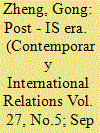

|
|
|
| 17 |
ID:
132700
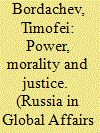

|
|
|
|
|
| Publication |
2014.
|
| Summary/Abstract |
It was not international diplomacy that has steered the situation over Ukraine into the condition of nearly systemic confrontation. The current state of affairs should be blamed squarely on the absence of diplomacy for nearly a quarter of a century.
|
|
|
|
|
|
|
|
|
|
|
|
|
|
|
|
| 18 |
ID:
175916


|
|
|
|
|
| Publication |
USA, Viking, 2020.
|
| Description |
xvi, 751p.Hbk
|
| Standard Number |
9780241491515
|
|
|
|
|
|
|
|
|
|
|
|
Copies: C:1/I:0,R:0,Q:0
Circulation
| Accession# | Call# | Current Location | Status | Policy | Location |
| 059926 | 973.929/OBA 059926 | Main | On Shelf | General | |
|
|
|
|
| 19 |
ID:
145230
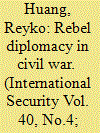

|
|
|
|
|
| Summary/Abstract |
In the midst of civil war, rebel groups often expend significant resources opening offices in foreign capitals, meeting with heads of state, expanding their overseas networks, appealing to international organizations, and contacting foreign media. Existing scholarship has generally neglected international diplomacy as an aspect of violent rebellion, focusing instead on rebel efforts at domestic organization. A systematic documentation of rebel diplomacy in post–1950 civil wars using new quantitative and qualitative data shows that rebel diplomacy is commonplace and that many groups demonstrate as much concern for overseas political campaigns as they do for domestic and local mobilization. Diplomacy, furthermore, is not a weapon of the militarily weak, but a tactical choice for rebel groups seeking political capital within an international system that places formidable barriers to entry on nonstate entities. An original analysis of the diplomacy of the National Union for the Total Independence of Angola in the Angolan civil war using archival sources further demonstrates why rebels may become active diplomats in one phase of a conflict but eschew diplomacy in another. More broadly, the international relations of rebel groups promise to be an important new research agenda in understanding violent politics.
|
|
|
|
|
|
|
|
|
|
|
|
|
|
|
|
| 20 |
ID:
116652
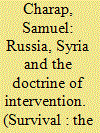

|
|
|
|
|
| Publication |
2013.
|
| Summary/Abstract |
Since the beginning of the Syrian crisis, there have been intermittent hopes that Moscow might play a constructive diplomatic role in resolving it. But the focus on Russia has been deeply misleading. Russia, for reasons that have little to do with Syria itself, was never going to be part of the solution to the crisis - at least on terms that the West and the Syrian opposition could accept. Further, Russia's centrality to international diplomacy on this issue and its seeming obstinacy expose deep flaws in post-Cold War Western doctrine on international intervention. Russia's centrality when it comes to Syria is more a function of those flaws than anything else.
|
|
|
|
|
|
|
|
|
|
|
|
|
|
|
|